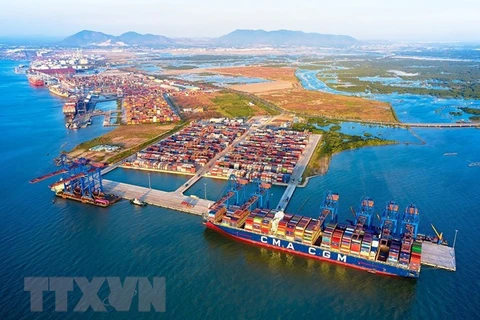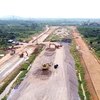Hanoi (VNA) – Despite the weak external environment, the Vietnamese economy remains resilient, and recovery is expected to pick up in the near term, said Asian Development Bank (ADB) Country Director for Vietnam Shantanu Chakraborty.
He made the comment at a press conference held in Hanoi on September 27 to release the Asian Development Outlook (ADO) September 2023.
In the report, the ADB said Vietnam’s economic growth is expected to slow down to 5.8% in 2023 and 6.0% in 2024, compared to the April 2023 forecast of 6.5% and 6.8% respectively, mainly due to the weak external demand.
Inflation forecasts are revised down to 3.8% from 4.5% for 2023 and 4.0% from 4.2% for 2024.
The ADO September 2023 noted that the main forces impacting the economy have been the global economic slowdown, monetary tightening in some advanced countries, and the disruption caused by exacerbated geopolitical tensions.
The weak external environment, including from a subdued recovery in China, has hampered export-led manufacturing, thus shrinking industrial production in Vietnam, said Chakraborty.
“However, the economy remains resilient, and recovery is expected to pick up in the near term, driven by strong domestic consumption, which is supported by moderate inflation, an acceleration of public investment, and improved trade activities,” he added.
 The Vietnamese economy remains resilient despite the weak external environment, according to the ADB. (Photo: vtv.vn) While Vietnam’s industrial production is shrinking due to falling global demand, other sectors are forecast to display healthy growth. Services are expected to continue expanding, supported by a revival in tourism and the recovery of associated services. Agriculture will benefit from rising food prices, and it is expected to expand by 3.2% in 2023 and the next year. Besides, public investment will be the key driver for economic recovery and growth in 2023, the ADB noted.
The Vietnamese economy remains resilient despite the weak external environment, according to the ADB. (Photo: vtv.vn) While Vietnam’s industrial production is shrinking due to falling global demand, other sectors are forecast to display healthy growth. Services are expected to continue expanding, supported by a revival in tourism and the recovery of associated services. Agriculture will benefit from rising food prices, and it is expected to expand by 3.2% in 2023 and the next year. Besides, public investment will be the key driver for economic recovery and growth in 2023, the ADB noted.
The report also highlighted significant risks to the outlook. Internally, slow disbursements of public investment and structural weaknesses in the real economy are the main downside risks to the economy.
Externally, a substantial slowdown in global growth and weak recovery in China remain risks to the economic outlook. Sustained high interest rates in the US and Europe and a stronger US dollar may lead to further challenges to the recovery of external demand, and weaknesses in the Vietnamese dong exchange rate, according to the ADB./.
He made the comment at a press conference held in Hanoi on September 27 to release the Asian Development Outlook (ADO) September 2023.
In the report, the ADB said Vietnam’s economic growth is expected to slow down to 5.8% in 2023 and 6.0% in 2024, compared to the April 2023 forecast of 6.5% and 6.8% respectively, mainly due to the weak external demand.
Inflation forecasts are revised down to 3.8% from 4.5% for 2023 and 4.0% from 4.2% for 2024.
The ADO September 2023 noted that the main forces impacting the economy have been the global economic slowdown, monetary tightening in some advanced countries, and the disruption caused by exacerbated geopolitical tensions.
The weak external environment, including from a subdued recovery in China, has hampered export-led manufacturing, thus shrinking industrial production in Vietnam, said Chakraborty.
“However, the economy remains resilient, and recovery is expected to pick up in the near term, driven by strong domestic consumption, which is supported by moderate inflation, an acceleration of public investment, and improved trade activities,” he added.
 The Vietnamese economy remains resilient despite the weak external environment, according to the ADB. (Photo: vtv.vn)
The Vietnamese economy remains resilient despite the weak external environment, according to the ADB. (Photo: vtv.vn) The report also highlighted significant risks to the outlook. Internally, slow disbursements of public investment and structural weaknesses in the real economy are the main downside risks to the economy.
Externally, a substantial slowdown in global growth and weak recovery in China remain risks to the economic outlook. Sustained high interest rates in the US and Europe and a stronger US dollar may lead to further challenges to the recovery of external demand, and weaknesses in the Vietnamese dong exchange rate, according to the ADB./.
VNA

























